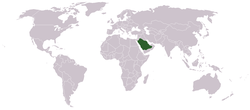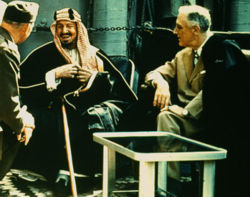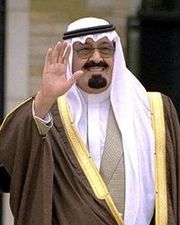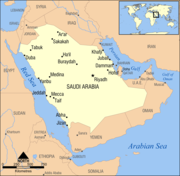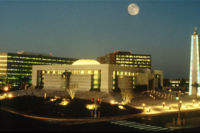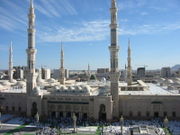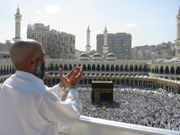Saudi Arabia
2007 Schools Wikipedia Selection. Related subjects: Countries; Middle Eastern Countries
| المملكة العربية السعودية Al-Mamlakah al-'Arabiyyah as-Sa'ūdiyyah Kingdom of Saudi Arabia |
|||||
|
|||||
| Motto: لا إله إلا الله محمد رسول الله (Arabic) Lā ilāhā illā-llāhu; muhammadun rasūlu-llāhi ( transliteration) "There is no god but The God; Muhammad is the Messenger of The God" |
|||||
| Anthem: Aash Al Maleek ("Long live the King") | |||||
| Capital (and largest city) |
Riyadh |
||||
| Official languages | Arabic | ||||
|---|---|---|---|---|---|
| Government | Absolute monarchy | ||||
| - King | Abdullah bin Abdulaziz | ||||
| - Crown Prince | Sultan bin Abdul Aziz | ||||
| Establishment | |||||
| - Kingdom declared | January 8, 1926 | ||||
| - Recognized | May 20, 1927 | ||||
| - Unified | September 23, 1932 | ||||
| Area | |||||
| - Total | 2,149,690 km² ( 14th) 829,996 sq mi |
||||
| - Water (%) | negligible | ||||
| Population | |||||
| - 2006 estimate | 27,019,7311 ( 46th 2) | ||||
| - Density | 11/km² ( 205th) 29/sq mi |
||||
| GDP ( PPP) | 2005 estimate | ||||
| - Total | $351.996 billion ( 27th) | ||||
| - Per capita | $15,338 ( 46th) | ||||
| HDI (2003) | 0.772 (medium) ( 77th) | ||||
| Currency | Riyal ( SAR) |
||||
| Time zone | ( UTC+3) | ||||
| Internet TLD | .sa | ||||
| Calling code | +966 | ||||
| 1 Population estimate includes 5,576,076 non-nationals 2 Rank is based on 2005 figures. |
|||||
The Kingdom of Saudi Arabia (Arabic: المملكة العربية السعودية) is the largest country on the Arabian Peninsula. It borders Jordan on the northwest, Iraq on the north and northeast, Kuwait, Qatar, Bahrain, and the United Arab Emirates on the east, Oman on the southeast, and Yemen on the south, with the Persian Gulf to its northeast and the Red Sea to its west. It is called "the land of the two holy mosques", a reference to Mecca and Medina, Islam's two holiest places. In English, it is most commonly referred to as Saudi Arabia (pronounced /ˈsɒdɪ/ or /ˈsaudɪ əˈɹeɪ̯bɪə/), often as just Saudi by many English-speaking expatriates in the kingdom, or, less commonly (as in international football events or in its national press) as KSA. (Arabia is sometimes also used to refer to the nation, but the term can also refer to the entire Peninsula and its varied nations and is thus ambiguous.)
History
The emergence of a Saudi state began in central Arabia in 1744. A regional ruler, Muhammad bin Saud, joined forces with an Islamic cleric and reformer, Muhammad Abd Al-Wahhab, to create a new political entity. Over the next one hundred and fifty years, the fortunes of the Saud family rose and fell several times as Saudi rulers contended with Egypt, the Ottoman Empire, and other Arabian families for control on the peninsula. The Saudi state was founded by the late King Abdul Aziz Al-Saud (known internationally as Abdul Aziz bin Saud).
In 1902, Abdul Aziz Ibn Saud captured Riyadh, the Al-Saud dynasty's ancestral capital, from the rival Al-Rashid family. Continuing his conquests, Abdul Aziz subdued Al-Ahsa, Al-Qatif, the rest of Najd, and the Hejaz between 1913 and 1926. On 8 January 1926 Abdul Aziz bin Saud became the King of Hejaz. On 29 January 1927 he took the title King of Najd (his previous Najdi title was Sultan). By the Treaty of Jedda, signed on May 20, 1927, the United Kingdom recognized the independence of Abdul Aziz's realm, then known as the Kingdom of Hejaz and Nejd. In 1932, these regions were unified as the Kingdom of Saudi Arabia.
The discovery of oil in March 1938 transformed the country economically, and has given the kingdom great prosperity.
Politics
The central institution of Saudi Arabian Government is the Saudi monarchy. The Basic Law adopted in 1992 declared that Saudi Arabia is a monarchy ruled by the sons and grandsons of the first king, Abd Al Aziz Al Saud, and that the Qur'an is the constitution of the country, which is governed on the basis of Islamic law ( Shari'a). It is interesting to note that Shari'a Law actually prohibits monarchy of any kind.
There are no recognized political parties or national elections, except the local elections which were held in the year 2005. The king's powers are theoretically limited within the bounds of Shari'a and other Saudi traditions. He also must retain a consensus of the Saudi royal family, religious leaders ( ulema), and other important elements in Saudi society. The Saudi government spreads Islam by funding construction of mosques and Qur'an schools around the world. The leading members of the royal family choose the king from among themselves with the subsequent approval of the ulema.
Saudi kings have gradually developed a central government. Since 1953, the Council of Ministers, appointed by and responsible to the king, has advised on the formulation of general policy and directed the activities of the growing bureaucracy. This council consists of a prime minister, the first prime minister and twenty ministers.
Legislation is by resolution of the Council of Ministers, ratified by royal decree, and must be compatible with the Shari'a. Justice is administered according to the Shari'a by a system of religious courts whose judges are appointed by the king on the recommendation of the Supreme Judicial Council, composed of twelve senior jurists. The combination of relatively high oil prices and exports led to a revenues windfall for Saudi Arabia during 2004 and early 2005. For 2004 as a whole, Saudi Arabia earned about $116 billion in net oil export revenues, up 35 percent from 2003 revenue levels. Saudi net oil export revenues are forecast to increase in 2005 and 2006, to $150 billion and $154 billion, respectively, mainly due to higher oil prices. Increased oil prices and consequent revenues since the price collapse of 1998 have significantly improved Saudi Arabia's economic situation, with real GDP growth of 5.2 percent in 2004, and forecasts of 5.7 percent and 4.8 percent growth for 2005 and 2006, respectively.
For fiscal year 2004, Saudi Arabia originally had been expecting a budget deficit. However, this was based on an extremely conservative price assumption of $19 per barrel for Saudi oil and an assumed production of 7.7 million bbl/d. Both of these estimates turned out to be far below actual levels. As a result, as of mid-December 2004, the Saudi Finance Ministry was expecting a huge budget surplus of $26.1 billion, on budget revenues of $104.8 billion (nearly double the country's original estimate) and expenditures of $78.6 billion (28 percent above the approved budget levels). This surplus is being used for several purposes, including: paying down the Kingdom's public debt (to $164 billion from $176 billion at the start of 2004); extra spending on education and development projects; increased security expenditures (possibly an additional $2.5 billion dollars in 2004; see below) due to threats from terrorists; and higher payments to Saudi citizens through subsidies (for housing, education, health care, etc.). For 2005, Saudi Arabia is assuming a balanced budget, with revenues and expenditures of $74.6 billion each.
In spite of the recent surge in its oil income, Saudi Arabia continues to face serious long-term economic challenges, including high rates of unemployment (around 13 percent of Saudi nationals, possibly higher), one of the world's fastest population growth rates, and the consequent need for increased government spending. All of these place pressures on Saudi oil revenues. The Kingdom also is facing serious security threats, including a number of terrorist attacks (on foreign workers, primarily) in 2003 and 2004. In response, the Saudis reportedly have ramped up spending in the security area (reportedly by 50 percent in 2004, from $5.5 billion in 2003). Saudi Arabia's per capita oil export revenues remain far below high levels reached during the 1970s and early 1980s. In 2004, Saudi Arabia earned around $4,564 per person, versus $22,589 in 1980. This 80 percent decline in real per capita oil export revenues since 1980 is in large part due to the fact that Saudi Arabia's young population has nearly tripled since 1980, while oil export revenues in real terms have fallen by over 40 percent (despite recent increases). Meanwhile, Saudi Arabia has faced nearly two decades of heavy budget and trade deficits, the expensive 1990-1991 war with Iraq, and total public debt of around $175 billion. On the other hand, Saudi Arabia does have extensive foreign assets (around $110 billion) which provide a substantial fiscal "cushion."
Independence of the judiciary is protected by law. The king acts as the highest court of appeal and has the power to pardon. Access to high officials (usually at a majlis; a public audience) and the right to petition them directly are well-established traditions.
Saudi municipal elections took place in 2005 and some commentators saw this a first tentative step towards the introduction of democratic processes in the Kingdom, including the legalisation of political parties. Other analysts of the Saudi political scene were more skeptical.
Human rights
Saudi courts impose capital punishment and corporal punishment, including amputations of hands and feet for serious robbery and homosexuality and floggings for lesser crimes such as "sexual deviance" (e.g. drunkenness). These punishments are often carried out in public, to add humiliation. The number of lashes is not clearly prescribed by law and varies according to the discretion of the presiding judges. The number ranges from dozens to several thousand, usually applied over a period of weeks or months. However, there are certain prescriptions of lashes for certain crimes: Theft is punishable by the amputation of the right hand. If the right hand has already been amputated, the left hand is chosen instead. Drinking, selling, or buying alcohol and sniffing drugs or injecting drugs is punished by a sentence of eighty lashes. Fornication - if proven by four righteous witnesses - is normally punished with forty lashes, as is adultery. During flogging, the face, head and vital organs of the person are protected. Murder, accidental death and bodily harm are open to punishment from the victim's family. Retribution may be sought in kind or through blood money. The blood money payable for a woman's accidental death is half as much as that for a man. In 2002, the United Nations Committee against Torture criticized Saudi Arabia over the amputations and floggings it carries out under the Shari'a. The Saudi delegation responded defending "legal traditions" held since the inception of Islam in the region 1400 years ago and rejected "interference" in its legal system.
Provinces
Saudi Arabia is divided into thirteen provinces (manaatiq, sing. mintaqah), many named after the major city found in each:
|
1 Al-Bahah |
8 'Asir |
|
a Northern Border Province; b Medina; c Eastern Province; d Mecca
Cities

| Population over 1 million | |
| Riyadh | capital |
| Jeddah | second largest city; pilgrimage gateway to Mecca; main Red Sea port |
| Dammam | Eastern Province capital; third largest metropolitan area |
| Makkah | Mecca, the holiest city in Islam |
| Other major cities | |
| Madinah | second holiest city in Islam (traditionally spelled Medina in English) |
| Ta'if | mountain resort above Mecca |
| Tabuk | northwestern border city near Jordan |
| Buraydah | city in north central Arabia |
| Hofuf | major urban centre of the Al-Hasa oasis |
| Qatif | large coastal oasis city and oilfield |
| Khamis Mushayt | western Arabian mountain city and military base |
Geography
The kingdom occupies eighty percent of the Arabian Peninsula. Most of the country's boundaries with the United Arab Emirates, Oman, and Yemen are not precisely defined, so the exact size of the country remains unknown. The Saudi government's estimate is 2,217,949 km² (856,356 mi²). Other reputable estimates vary between 1,960,582 km² (756,934 mi²) and 2,240,000 km² (864,869 mi²). The kingdom is commonly listed as the world's fifteenth-largest nation (after Mexico) and is comparable in size to Indonesia.
Its geography is surprisingly varied. From the western coastal region ( At-Tihamah), the land rises from sea level to a peninsula-long mountain range (jabal al-Hijaz) beyond which are plateaus. The southwestern 'Asir region has mountains as high as 3,000 metres (9,840 ft) and is known for having the greenest and freshest climate in all of the country, one that attracts many Saudis to resorts such as Ta'if and Abha in the summer months. The east is primarily rocky or sandy lowland continuing to the shores of the Persian Gulf. The infamous "Empty Quarter" along the country's imprecisely defined southern borders contains the nearly lifeless Rub' al-Khali desert.
In line with common stereotypes, much of the nation's landmass consists of desert and semi-desert, which, except for its dwindling traditional bedouin population, is mostly uninhabited. In these parts of the country, vegetation is limited to weeds, xerophytic herbs and shrubs. Less than 2% of the kingdom's total area is suitable for cultivation. Population centers are mainly located along the eastern and western coasts and densely populated interior oases such as Hofuf and Buraydah. In some extended areas, primarily the Rub' al-Khali and the Arabian Desert and East Sahero-Arabian xeric shrublands, there is no population whatsoever, although the petroleum industry is constructing a few planned communities there. Saudi Arabia has no permanent year-round rivers or lakes; however, its coastline extends for 2,640 kilometers (1,640 mi) and, on the Red Sea side, offers world-class coral reefs, including those in the Gulf of Aqaba.
Native animals include the ibex, wildcats, baboons, wolves, and hyenas in the mountainous highlands. Small birds are found in the oases. The coastal area on the Red Sea with its coral reefs has a rich marine fauna.
Climate
Extreme heat and aridity are characteristic of most of Saudi Arabia. It is one of the few places in the world where summer temperatures above 50°C (120°F) are common, while in winter frost or snow can occur in the interior and the higher mountains, although this does not occur annually. The average winter temperature range is 8° to 20°C (47° to 68°F) in January in interior cities such as Riyadh and 19° to 29°C (66° to 83°F) in Jeddah on the Red Sea coast. The average summer range in July is 27° to 43°C (81° to 109°F) in Riyadh and 27° to 38°C (80° to 100°F) in Jeddah. Nighttime temperatures in the mid desert can be famously chilly even in summer, as sand gives up daytime heat rapidly once the sun has set.
Annual precipitation is usually sparse (up to 100 millimetres (4 in) in most regions), although sudden downpours can lead to violent flash floods in wadis. Annual rainfall in Riyadh averages 100 mm (4 in) and falls almost exclusively between January and May; the average in Jeddah is 54 mm (2.1 in) and occurs between November and January. Plants can still survive in Saudi Arabia, mostly in the south-east mountains and lowlands. They bloom mid-March through mid-May. The plants provide food for birds and insects.
Economy
Saudi Arabia's economy is petroleum-based; roughly 75% of budget revenues and 90% of export earnings come from the oil industry. The oil industry comprises about 45% of Saudi Arabia's gross domestic product, compared with 40% from the private sector (see below). Saudi Arabia has claimed to be in possession of 260.1 billion barrels of oil reserves (about 24% of the world's proven total petroleum reserves) as of 2003. Moreover, according to the Saudi government, the proven reserves increase gradually as more oil fields are discovered, unlike most other oil-producing countries. It must be noted, however, that, those figures have been contested and that Saudi Arabia's actual reserves may be notably lower. Saudi Arabia was a key player in the successful efforts of OPEC and other oil producing countries to raise the price of oil in 1999 to its highest level since the Gulf War by reducing production.
The government is attempting to promote growth in the private sector by privatizing industries such as power and telecom. Saudi Arabia announced plans to begin privatizing the electricity companies in 1999, which followed the ongoing privatization of the telecommunications company. Shortages of water and rapid population growth may constrain government efforts to increase self-sufficiency in agricultural products.
In the 1990s, Saudi Arabia experienced a significant contraction of oil revenues combined with a high rate of population growth. Per capita income has fallen from $25,000 in 1980 to $8,000 in 2003, up from about $7,000 in 1999. The decline in inflation-adjusted per-capita income from 1980 to 1999 set a record, being by far the worst such decline suffered by any nation-state in history.
In 2003, the price of oil jumped to record high of 40 to 50 dollars, which triggered a second oil boom. Saudi Arabia's budget surplus has crossed $28 billion (110SR billion) in 2005. Tadawul (the Saudi stock market Index) finished 2004 with a massive 76.23% to close at 4437.58 points. Market capitalization was up 110.14% from a year earlier to stand at $157.3 billion (589.93SR billion), which makes it the biggest stock market in the Middle East.
OPEC limits its members oil production based on its "proven reserves." The higher their reserves, the more OPEC allows them to produce. Because of this, Saudi Arabia does not allow independent verification of their claimed "proven reserves." Over the past fifteen years, Saudi Arabia's claimed reserves have been flat, with the exception of an increase of about 100 billion barrels between 1987 and 1988. Many experts now believe that Saudi Arabia is greatly exaggerating its reserves and may soon show production declines (see Peak Oil).
To diversify the economy, Saudi Arabia launched a new city on the western coast with investments exceeding 26.6 billion dollars. The city which is named " King Abdullah Economic City" will be built near al-Rabegh industrial city north to Jeddah. The new city, where construction work started in December 2005, includes a port which is ten times larger than Rotterdam, the world's largest port of Rotterdam. Extending along a coastline of 35 km, the city will also include petrochemical, pharmaceutical, tourism, finance and education and research areas.
Saudi Arabia officially became a WTO member in December 2005.
Foreign labour
Saudi Arabia is a country in which many men and women from South, South East, and East Asia, East Africa and the Middle East seek work. There are also some people from North America, South America, and Europe. Hundreds of thousands of low- skilled workers and skilled workers from regions of the developing world migrate to Saudi Arabia, sometimes only for a short period of time, to work. Although exact figures are not known, skilled experts in the banking and services professions seek work in the Kingdom.
It is reported that some guest workers present in the country (like in many countries) are sometimes subject to mistreatment, as documented by Human Rights Watch: Template:Quoatation
Demographics
Saudi Arabia's population as of July 2006 is estimated to be about 27,019,731, including about 5,576,076 resident foreigners. Until the 1960s, most of the population was nomadic or semi-nomadic; due to rapid economic and urban growth, more than 95% of the population now is settled. The birth rate is 29.56 births per 1,000 people. The death rate is only 2.62 deaths per 1,000 people. Some cities and oases have densities of more than 1,000 people per square kilometre (2,600/sq mi).
Around 90% of Saudis are ethnically Arab. In addition, there are some citizens of Asian and sub-Saharan/East African ancestry. There are some 7 million migrants from countries all around the world, including: Indian: 1.4 million, Bangladeshi: 1 million, Pakistani: 900,000, Filipino: 800,000, and Egyptian: 750,000. Many Arabs from nearby countries are employed in the kingdom. There are around 100,000 Westerners in Saudi Arabia, most of whom live in compounds or gated communities.
The Saudi government states that all citizens must be Muslim. The majority of the population adheres to a strict theological interpretation within Islam most commonly known as Salafi or Wahhabism. The Shia Population of the country is estimated at around 15%, primarily in the Eastern provinces, and larger cities.
The country allows religious minorities such as Christians and Hindus to enter the country as temporary workers. The U.S. State departments suggest that there are 500,000 to 1 million people who adhere to the Catholic faith.
The exit and entry visa card requirements ask applicants for their religious affiliation.
Education
At the time the Kingdom of Saudi Arabia was founded in 1932, education was not accessible to everyone and limited to individualized instruction at religious schools in mosques in urban areas. These schools taught Islamic law and basic literacy skills. By the end of the century, Saudi Arabia had a nationwide educational system providing free training from preschool through university to all citizens. The modern Saudi educational system provides quality instruction in diverse fields of modern and traditional arts and sciences. This diversity helps meet the Kingdom's growing need for highly-educated citizens to build on its rapid progress.
Formal primary education began in Saudi Arabia in the 1930s. By 1945, King Abdulaziz bin Abdelrahman Al-Saud, the country's founder, had initiated an extensive program to establish schools in the Kingdom. Six years later, in 1951, the country had 226 schools with 29,887 students. In 1954, the Ministry of Education was established, headed by then Prince Fahd bin Abdulaziz as the first Minister of Education. The first university, now known as King Saud University, was founded in Riyadh in 1957.
Today, Saudi Arabia's nationwide public educational system comprises eight universities, more than 24,000 schools, and a large number of colleges and other educational and training institutions. Open to every citizen, the system provides students with free education, books and health services. Over 25 percent of the annual State budget is for education including vocational training. The Kingdom has also worked on scholarship programs to send students overseas, mainly to the United States, Canada, the United Kingdom, Australia, Japan, Malaysia and other nations. Over the past couple of years, thousands of students have been sent to higher-educations programs each year.
The study of Islam remains at the core of the Saudi educational system. The Islamic aspect of the Saudi national curriculum is examined in a recent report by Freedom House. The report finds how, in religious education classes, children are taught to deprecate other religions, in addition to other branches of Islam. The discussion of other religions in a favourable light is forbidden. The anti-semitic book The Protocols of the Elders of Zion is taught as fact. The Saudi religious studies curriculum is taught outside the Kingdom in madrassas throughout the world.
Sports
Sports are a very popular pastime for the young men and women in Saudi Arabia. Even though soccer is the most played game, Saudi Arabia has participated in many world games such as the summer Olympics, volleyball, basketball and other sports. The national football team is most known for qualifying in four consecutive times in the FIFA World Cup and six times at the Asian Cup, which the team won three times and was runner-up two times. Some popular soccer players include Majed Abdullah, Mohamed Al-Deayea, Sami Al Jaber, Saeed Al-Owairan,and Ahmed Jameel.
Culture
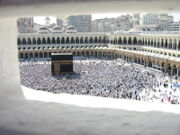
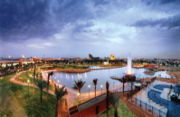
Saudi Arabian culture revolves almost entirely around the religion of Islam. Islam's two holiest sites, Mecca and Medina, are located in the country. Every day, five times a day, Muslims are called to prayer from the minarets of mosques which dot the country. The weekend consists of Thursday and Friday. The public practice of any religion other than Islam, including Christianity and Judaism, the presence of churches, and open possession of Christian religious materials are outlawed in Saudi Arabia. Anyone breaking this law is sentenced to beheading (see Status of religious freedom in Saudi Arabia). Islam's holy book the Qur'an is Saudi Arabia's constitution, and Shari'ah (Islamic law) is the foundation of its legal system.
One of Saudi Arabia's most compelling folk rituals is the Ardha, the country's national dance. This sword dance is based on ancient Bedouin traditions: drummers beat out a rhythm and a poet chants verses while sword-carrying men dance shoulder to shoulder. Al-sihba folk music, from the Hijaz, has its origins in Arab Andalusia, a region of medieval Spain. In Mecca, Medina and Jeddah, dance and song incorporate the sound of the al-mizmar, an oboe-like woodwind instrument. The drum is also an important instrument according to traditional and tribal customs.
Saudi Arabian dress is strongly symbolic, representing the people's ties to the land, the past, and Islam. The predominantly loose and flowing, but covering garments reflect the practicalities of life in a desert country as well as Islam's emphasis on conservative dress. Traditionally, men usually wear an ankle-length shirt woven from wool or cotton (known as a thawb), with a shimagh (a large checkered square of cotton held in place by a cord coil) or a ghutra (a plain white square made of finer cotton, also held in place by a cord coil) worn on the head. For rare chilly days, Saudi men wear a camel-hair cloak ( bisht) over the top. Women's clothes are decorated with tribal motifs, coins, sequins, metallic thread, and appliques. However, Saudi women must wear a long cloak ( abaya) and veil ( niqab) when they leave the house to protect their modesty. The law does not apply to foreigners at such a high degree, but both men and women are told to dress modestly.
Islam forbids the eating of pork and the drinking of alcohol, and this law is enforced strictly throughout Saudi Arabia. Arabic unleavened bread, or khobz, is eaten with almost all meals. Other staples include cooked lamb, grilled chicken, falafel (deep-fried chickpea balls), shawarma (spit-cooked sliced lamb), and fuul (a paste of fava beans, garlic and lemon). Traditional coffee houses used to be ubiquitous, but are now being displaced by food-hall style cafes. Arabic tea is also a famous custom, which is used in both casual and formal meetings between friends, family and even strangers. The tea is black (without milk) and has herbal flavoring that comes in many variations.
Public theatres and cinemas are prohibited, as Wahabbi tradition deems those institutions to be incompatible with Islam. However, in private compounds such as Dhahran and Ras Tanura public theaters can be found, but often are more popular for local music, arts, and theatre productions rather than the exhibition of motion pictures. Recently plans for some cinemas that will allow Arabic cartoons to be featured in cinemas for women and children were announced. Videos and DVDs of popular American movies are legal and widely available.
The cultural heritage is celebrated at the annual Jenadriyah Cultural festival. During this event, the Saudi national cake, carrot cake, is handed out to visitors.
Geographic locale
 |
Persian Gulf |
 |
||
| Red Sea |
Afghanistan • Armenia • Azerbaijan 1 • Bahrain • Bangladesh • Bhutan • Brunei • Cambodia • People's Republic of China 2 • Cyprus • East Timor 3 • Georgia 1 • India • Indonesia 3 • Iran • Iraq • Israel • Japan • Jordan • Kazakhstan 1 • Kuwait • Kyrgyzstan • Laos • Lebanon • Malaysia • Maldives • Mongolia • Myanmar • Nepal • North Korea • Oman • Pakistan • Philippines • Qatar • Russia 1 • Saudi Arabia • Singapore • South Korea • Sri Lanka • Syria • Tajikistan • Thailand • Turkey 1 • Turkmenistan • United Arab Emirates • Uzbekistan • Vietnam • Yemen
For dependent and other territories, see Dependent territory and List of unrecognized countries.
1 Partly in Europe. 2 The Republic of China (Taiwan) not officially recognized by the United Nations; see Political status of Taiwan. 3 Partly or wholly reckoned in Oceania.
Eurasia: Bahrain • Bangladesh • Christmas Island • Cocos (Keeling) Islands • India • Indonesia • Iran • Iraq • Israel • Kuwait • Malaysia • Maldives • Myanmar • Oman • Pakistan • Qatar • Saudi Arabia • Sri Lanka • Thailand • United Arab Emirates • Yemen
Africa: Comoros • Djibouti • Eritrea • Kenya • Madagascar • Mauritius • Mayotte • Mozambique • Seychelles • Somalia • Somaliland • South Africa • Sudan • Tanzania
Oceania: Australia • Christmas Island • Cocos (Keeling) Islands
Islands: Bahrain • Christmas Island • Cocos (Keeling) Islands • Madagascar • Maldives • Mauritius • Mayotte • Seychelles • Sri Lanka
Bahrain · Kuwait · Oman · Qatar · Saudi Arabia · United Arab Emirates
Afghanistan • Albania • Algeria • Azerbaijan • Bahrain • Bangladesh • Benin • Burkina Faso • Brunei • Cameroon • Chad • Comoros • Côte d'Ivoire • Djibouti • Egypt • Gabon • Gambia • Guinea • Guinea-Bissau • Guyana • Indonesia • Iran • Iraq • Jordan • Kuwait • Kazakhstan • Kyrgyzstan • Lebanon • Libya • Maldives • Malaysia • Mali • Mauritania • Morocco • Mozambique • Niger • Nigeria • Oman • Pakistan • State of Palestine • Qatar • Saudi Arabia • Senegal • Sierra Leone • Somalia • Sudan • Surinam • Syria • Tajikistan • Turkey • Tunisia • Togo • Turkmenistan • Uganda • Uzbekistan • United Arab Emirates • Yemen
Observer countries: Bosnia and Herzegovina • Central African Republic • Russia • Thailand • Turkish Republic of Northern Cyprus
Observer Muslim organizations and communities: Moro National Liberation Front
Observer international organizations: Economic Cooperation Organization • Organisation of African Unity • League of Arab States • Non-Aligned Movement • United Nations
African: Lesotho • Morocco (⁂) • Swaziland (*)
Asian: Bahrain (⁂) • Bhutan (*) • Brunei (*) • Cambodia (!) • Japan • Jordan (⁂) • Kuwait (⁂) • Malaysia ( !) • Nepal • Oman (*) • Qatar (*) • Saudi Arabia (*) • Thailand • Tonga • United Arab Emirates ( !)
Commonwealth Realms: Antigua and Barbuda • Australia • Bahamas • Barbados • Belize • Canada • Grenada • Jamaica • New Zealand • Papua New Guinea • Saint Kitts and Nevis • Saint Lucia • Saint Vincent and the Grenadines • Solomon Islands • Tuvalu • United Kingdom
Other European monarchies (including the EU): Andorra ( !) • Belgium • Denmark • Liechtenstein (⁂) • Luxembourg • Monaco (⁂) • Netherlands • Norway • Spain • Sweden • Vatican City ( Holy See) (*!)
* absolute monarchy, ⁂ semi-constitutional monarchy, ! electoral monarchy


